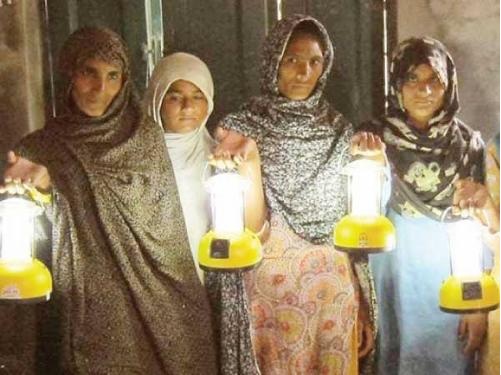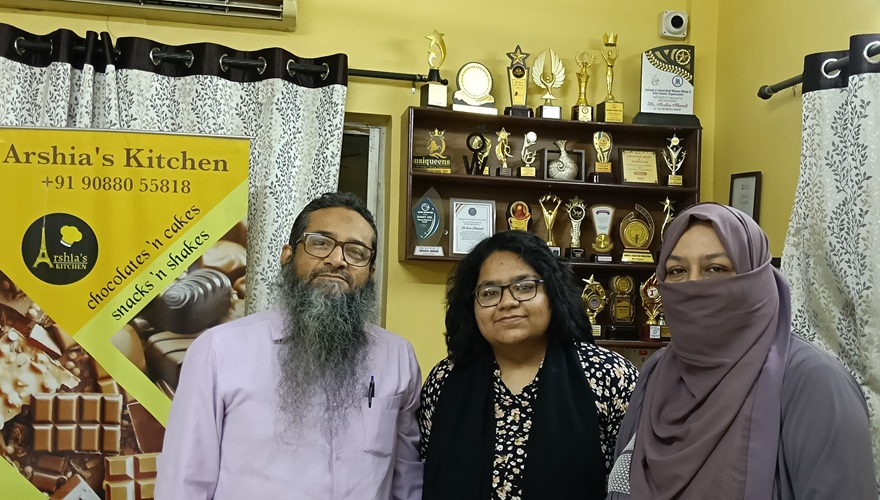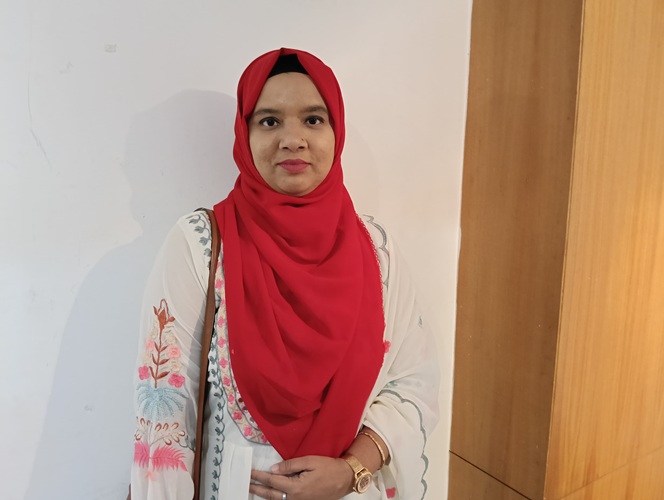Islamabad: (IINA) – As the sun sets and darkness falls over a village outside Bahawalpur, Shama Bibi switches on her solar lantern and starts sewing clothes for an upcoming family wedding.
Not long ago, nightfall would have forced her to stop working. But now with access to solar-powered lamps, Bibi can sew as long as she needs to. “The solar lantern has changed my life,” said the 35-year-old widow and mother of three. “I can sew clothes even in the night and earn enough to make both ends meet.” Bibi has recently become a “Light Lady”, one of the women that the Buksh Foundation, a non-profit organization in Lahore, has trained to help spread the benefits of solar energy throughout rural Pakistan.
Under the foundation’s project Lighting a Million Lives, in collaboration with The Energy and Resources Institute (TERI) in India, women are taught how to operate and maintain solar charging stations in their homes. The two “Light Ladies” in each of the focus villages also are given 50 solar lanterns to rent to others in their community. The one-time cost of around $5,500 to set up a solar charging station and set of lanterns is funded by donors.
Bibi says she charges a daily rent of 4 rupees ($0.04) per lantern and earns around 5,500 rupees ($54) each month.
“I’ve started sending my youngest son to school as I earn enough now to meet all the expenses,” she said. Villagers can also charge their mobile phones at the solar station, instead of having to travel to Bahawalpur and back. The foundation has so far installed solar charging stations in 150 off-grid villages around the country and plans to reach 4,000 villages by 2017.
According to the World Bank, about 44 percent of households in Pakistan are not connected to the grid. More than 80 percent of those are in rural areas. There, almost half of households use kerosene as a primary or secondary source of lighting, a 2012 World Bank survey found. Some use candles, due to the high cost of kerosene. “Our target is to provide sustainable energy to far-flung rural off-grid areas of Pakistan and we especially want to empower women in these areas through the project,” said Fiza Farhan, CEO of the Buksh Foundation.
She said the solar lanterns not only are convenient and a source of income for some villagers but also help reduce climate-changing carbon emissions, as each lantern replaces around 500 to 600 liters of kerosene during its 10-year lifespan.
The foundation has a permanent help line at its central office in Lahore to keep in touch with the “Light Ladies” and provide them technical assistance round the clock, Farhan said. She said dozens of people contact the foundation daily asking for more solar lanterns in their villages and requesting the installation of charging stations in nearby villages.
“More women want to become Light Ladies, but for the moment we have been training only two women in each village,” she said, to ensure that each woman makes a decent income once the profits are split.
Qamar-uz-Zaman, a climate change advisor to the sustainable development organization LEAD-Pakistan, said Pakistan’s energy shortages could be reduced substantially if the government would provide technical and financial assistance for sustainable development initiatives such as Lighting a Million Lives. Pakistan faces a year-round electricity shortfall that hits around 7,000 megawatts in the summer. The country’s rural areas often suffer blackouts of more than 14 hours a day while urban areas can experience up to 10 hours a day without power, according to Thomson Reuters Foundation.
To tackle the crisis, the government needs to support off-grid solar projects and encourage people to use renewable energy sources to decrease the stress on the national grid, said Zaman. “The government can subsidize the projects by claiming international climate financing and reaching out to international donors to fund them,” he said. Gul Muhammad, 62, a farmer in the village outside Bahawalpur, can attest to the benefits of solar energy.
The lantern he hires from one of the “Light Ladies” has allowed him to cut the amount of kerosene he uses to light his farm, saving him 350 rupees ($3) each month.
The availability of cheap, portable light also means he can irrigate his farmland during dusk and dawn, times of day that previously were too dangerous due to the presence of snakes in the area. “I can now work three to four hours extra on my farmland,” he said. “And this is helping increase my income too.”






0 Comments